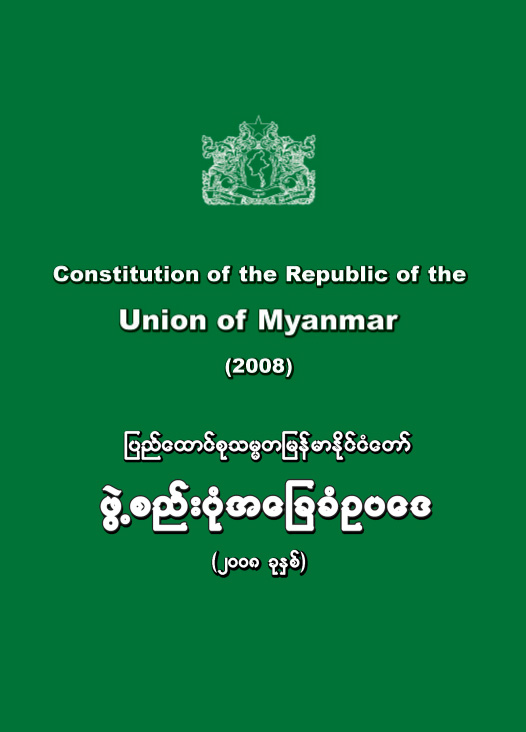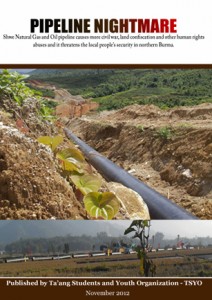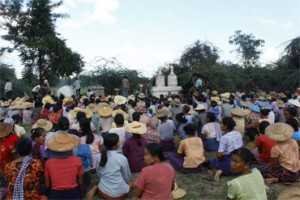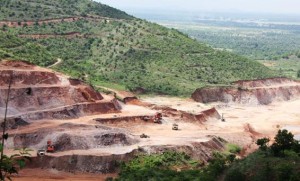Posts Tagged ‘Land Confiscation’ (91 found)
Same Constitution, Same Problems
 The Special Rapporteur on the Situation of Human Rights in Myanmar, Tomás Ojea Quintana, finished his 7th visit to Burma on Saturday and his report highlights the grave human rights concerns in Burma today. The escalation of conflict in Kachin State, communal violence in Arakan State, the continuing detention and torture of political prisoners, land confiscation due to development projects, restrictions on freedom of association and assembly are among the poor human rights conditions stated in his report. The scale of such human rights violations, in spite of the reforms initiated by the government, emphasizes the necessity of the role of the Special Rapporteur.
The Special Rapporteur on the Situation of Human Rights in Myanmar, Tomás Ojea Quintana, finished his 7th visit to Burma on Saturday and his report highlights the grave human rights concerns in Burma today. The escalation of conflict in Kachin State, communal violence in Arakan State, the continuing detention and torture of political prisoners, land confiscation due to development projects, restrictions on freedom of association and assembly are among the poor human rights conditions stated in his report. The scale of such human rights violations, in spite of the reforms initiated by the government, emphasizes the necessity of the role of the Special Rapporteur.
Many of the human rights violations that Quintana reported have a direct obstacle in the path of correcting these abuses: the 2008 Constitution. The 2008 Constitution was written by the military without Daw Aung San Suu Kyi and the National League for Democracy or genuine representation from Burma’s ethnic areas. It was described by the 88 Generation Students Group as a “sham constitution” and through corruption, fraud and intimidation, the ruling junta outrageously claimed that 92% of the people who voted ratified the document […]
Shwe Pipeline Brings Land Confiscation, Militarization and Human Rights Violations to the Ta’ang People
The Ta’ang Students and Youth Organization (TSYO) released a report today called “Pipeline Nightmare” that illustrates how the Shwe Gas and Oil Pipeline project, which will transport oil and gas across Burma to China, has resulted in the confiscation of people’s lands, forced labor, and increased military presence along the pipeline, affecting thousands of people.
Moreover, the report documents cases in 6 target cities and 51 villages of human rights violations committed by the Burmese Army, police and people’s militia, who take responsibility for security of the pipeline […]
• • •Pipeline Nightmare
 Shwe Pipeline Brings Land Confiscation, Militarization and Human Rights Violations to the Ta’ang People
Shwe Pipeline Brings Land Confiscation, Militarization and Human Rights Violations to the Ta’ang People
This report illustrates how the Shwe Gas and Oil Pipeline project, which will transport oil and gas across Burma to China, has resulted in the confiscation of people’s lands, forced labor, and increased military presence along the pipeline, affecting thousands of people […]
• • •Myanmar at the HLP Crossroads
Few issues are as frequently discussed and politically charged in transitional Myanmar as the state of housing, land and property (HLP) rights. The effectiveness of the laws and policies that address the fundamental and universal human need for a place to live, to raise a family […]
• •AHRC Expresses Solidarity with Protesting Farmers
The Asian Human Rights Commission on Wednesday sent a message of support to farmers and their allies gathering for a “people’s conference” to oppose land confiscation and degradation for a copper mining project […]
• • •Both Sides File Suits in Mine Protest
 Over 1,000 villagers staged a symbolic demonstration on Tuesday at a graveyard to dramatize their struggle against a Chinese co-owned mine in the Letpadaung mountain range near Sagaing Division’s Monywa city.
Over 1,000 villagers staged a symbolic demonstration on Tuesday at a graveyard to dramatize their struggle against a Chinese co-owned mine in the Letpadaung mountain range near Sagaing Division’s Monywa city.
The villagers are protesting their displacement from land following months of confrontations with the company and the authorities […]
• •Land Grabbing in Dawei (Myanmar/Burma): An (Inter)National Human Rights Concern
Land grabbing is an urgent concern for people in Tanintharyi Division, and ultimately one of national and international concern, as tens of thousands of people are being displaced for the Dawei Special Economic Zone (SEZ). Dawei lies within Myanmar’s (Burma) southernmost region, the Tanintharyi Division, which borders Mon State to the North, and Thailand to the East, on territory that connects the Malay Peninsula with mainland Asia […]
• • •LAND NOT FOR SALE!: Letter of Global Solidarity against Land Grabs in Burma/Myanmar
The current reforms in Burma/Myanmar are worsening land grabs in the country. Since the mid-2000s there has been a spike in land grabs, especially leading up to the 2010 national elections. Military and government authorities have been granting large-scale land concessions to well-connected Burmese companies. Farmers’ protests against land grabs have drawn recent public attention to many high profile cases, such as Yuzana’s Hukawng Valley cassava concession, the Dawei SEZ in Tanintharyi Region near the Thai border, Zaygaba’s industrial development zone outside Yangon, and the current Monywa copper mine expansion in Sagaing Division, among many others […]
• • •Mining, Repression and Imprisonment, an Uncertain Future
 Burma has been internationally praised for moving in a more democratic direction recently. Sadly for many citizens these changes are a world away. Their interactions with the Burma government are characterized by the same repressive, corrupt, strong armed tactics that made Burma an international pariah for decades.
Burma has been internationally praised for moving in a more democratic direction recently. Sadly for many citizens these changes are a world away. Their interactions with the Burma government are characterized by the same repressive, corrupt, strong armed tactics that made Burma an international pariah for decades.
In the Letpadaung mountains, huge amounts of land have been forcibly confiscated by the government, environmental degradation has occurred and a policy of arrest and detention of peaceful protestors has been implemented. The Monywa Copper Project is located in central Burma’s Sagaing Division with four large deposits: Sabetaung, Sabetaung South, Kyisintaung and Letpadaung. The project covers almost 8,000 acres of land, the majority of which was forcibly taken from villagers.
Resource extraction has been the cause of some of Burma’s largest human rights violations and land confiscations. The Monywa Copper Project is the country’s largest mine in terms of recovery rates, production and revenue. Protests over the project and national attention have been growing, as have the number of arrests and detentions in association with those protests and land confiscation cases.
• • •Human Rights Commission receives lots of complaints daily
Around 30 complaint letters come daily to Myanmar National Human Rights Commission and most are related to farmland problems, its chairman says.
“We receive complaints about various issues. At present, we are dealing with some. But we haven’t decided on which ones we have to handle […]
• •








 All posts
All posts